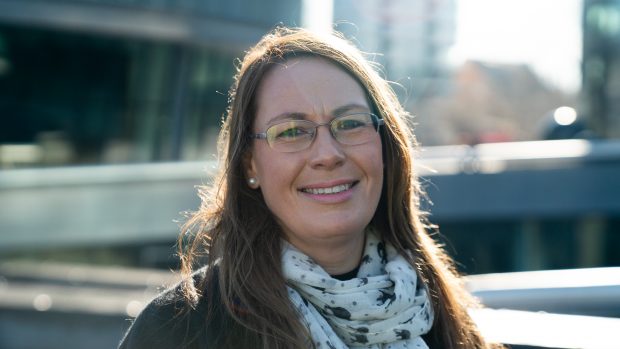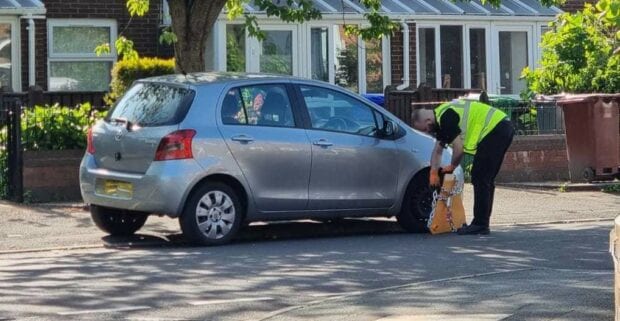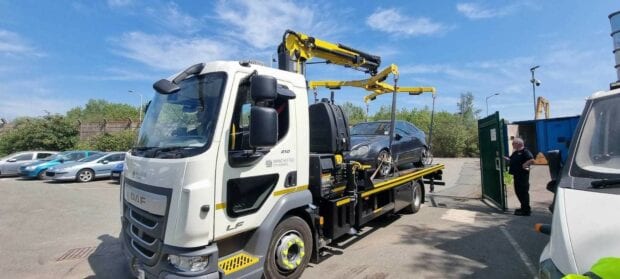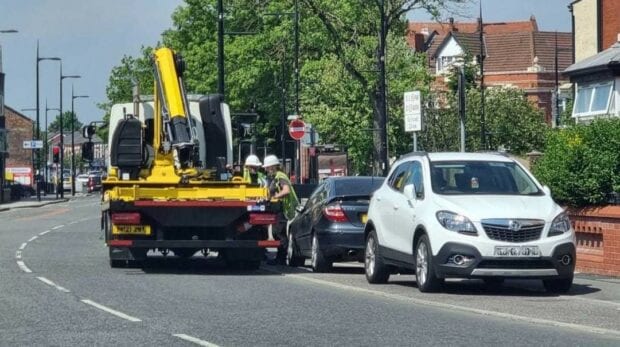Vehicle tax evasion is against the law and while over 98% of vehicles are taxed correctly, a small minority of vehicle keepers continue to break the law. It costs HM Treasury £94 million every year, vital funds which would otherwise go towards public services so it’s important to catch tax evaders.
We work closely with our devolved power local authority partners and the police to enforce against tax evaders and have recently been on the streets in Manchester, Walsall, Dudley and Nottingham carrying out targeted enforcement against untaxed vehicles.
I’m a National Enforcement Manager at DVLA, which means I’m the contract manager for the Wheelclamping & Automatic Number Plate Recognition (ANPR) enforcement contracts and the ANPR vehicle contract. I’m also the senior leader for Wheelclamping and ANPR staff both on site and remotely.

There are always new challenges in this line of work, but my role is to encourage and educate people to comply with the law by taxing their vehicles. The last Roadside Survey, which has been carried out at 256 sites across the UK every 2 years since 2011, showed 98.4% of people were doing the right thing. We’re so pleased this was higher than the previous survey, but that still means that 1.6% of keepers across the UK are not taxing their vehicles.
Taxing is not taxing! It is really simple to do and it can be done online in just a few clicks, so why would anyone risk losing their vehicle and paying fines? There are also options to pay for your tax monthly by Direct Debit so there really is no excuse.
What are devolved powers?
Devolved powers are given to local authorities who have chosen to take on DVLA’s legal responsibility to take enforcement action on untaxed vehicles on the road in their area. This power is devolved from the Secretary of State for Transport and I’m responsible for working with current and future partners to support them to conduct enforcement activity in their area. This means that in these areas we have additional enforcement capability to support the national enforcement contract.
Police services can also be given devolved powers, including the ability to remove untaxed vehicles from the road under the same process as local authorities.

We have 84 Devolved Power Partners (DPPs) across England and Wales, and our national contractor, NSL, works alongside them to provide full geographical coverage across the UK.
We know from speaking to our DPPs how important having this responsibility to enforce is to them. They work hard to remove and disrupt criminal behaviour in their area, and I’m really proud that we are a part of that important work. DVLA staff also support police services in conducting targeted operations as they have the power to stop vehicles in transit which we do not – another way to encourage people to tax their vehicle.
What’s been happening in Manchester, Walsall, Dudley and Nottingham?
These 4 areas are already committed DPPs but we wanted to give our help, advice and support to encourage increased activity whilst learning more about how they work. This has helped me to build a 12-month plan of working closer with our DPPs.
The support we provided was in the form of our own DVLA ANPR fleet who helped the DPPs to identify vehicle tax evasion hotspots, share intelligence and tackle untaxed vehicles by either clamping, impounding or issuing warning notices to the keepers.
Across the operations, we identified over 450 vehicles which were not taxed correctly so our DPP enforcement team took action either by clamping or impounding the vehicle – taking it to a local pound.

There are a few stand-out experiences for me. In Nottingham we found an untaxed car that the keeper had tried to hide behind a hedge, whilst in Dudley there were 7 untaxed cars parked in a row at the bottom of a road leading to an industrial estate – they resulted in a warning notice and 6 clamps.
In Walsall we put a warning notice on a large van that had not been taxed which had no rear tyres but was on bricks. When we were passing by later on, we found it had been moved onto a private driveway – we do not know how they moved it but we were pleased the notice had the desired effect for the keeper to take action.
We covered a really large area in Manchester where I witnessed an instant lift, where a car was lifted away from a main road and taken to the pound and, unfortunately, some of the abuse that the street team regularly gets from individuals who have not taxed their car.

What’s next?
The last few months of working more closely with our DPPs has given us lots of insight into how they work and what more we can do to support them. If we can understand the different challenges that they face, then we will know more about how we can help them.
We all share the same goal – to remove untaxed vehicles from the road – this is only fair for those vehicle keepers who have done the right thing and taxed correctly. Anything that we can do to help, I absolutely believe we have a duty to do so.
I’m really proud of my teams, both those who work behind the scenes in Swansea and members who work remotely, for the hard work and challenging contact that they deal with every day.
Action is still ongoing by many of our DPPs and we’ve recently launched a new communications campaign reminding vehicle keepers to tax. You can listen out for the adverts on radio or you may see it on digital channels.
To avoid the risk of losing your vehicle, make sure it’s taxed – you can check online to see if your vehicle is taxed in just a few steps. And if you need to tax your vehicle, it’s quick and easy to do online and you can spread the cost of vehicle tax by setting up a Direct Debit.
